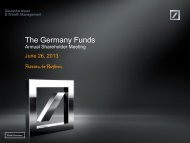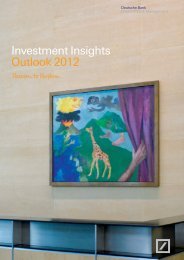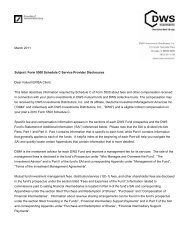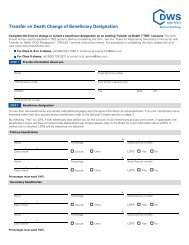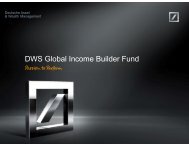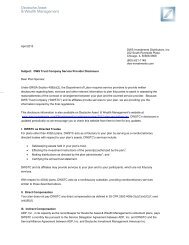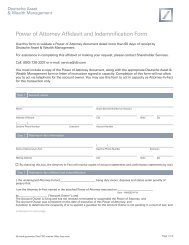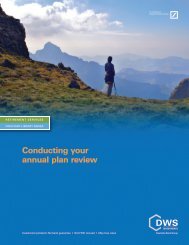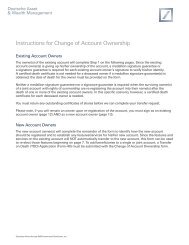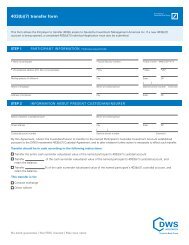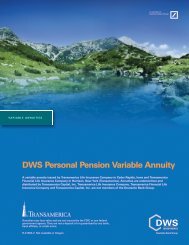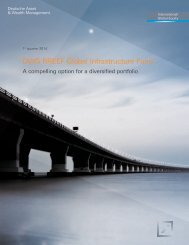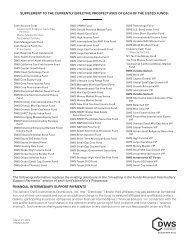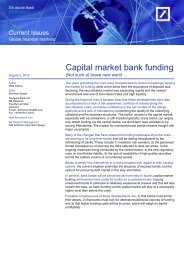Semi Annual Report - DWS Investments
Semi Annual Report - DWS Investments
Semi Annual Report - DWS Investments
Create successful ePaper yourself
Turn your PDF publications into a flip-book with our unique Google optimized e-Paper software.
INTERVIEW WITH PORTFOLIO MANAGEMENT TEAM — RAINER VERMEHREN ANDODENIYAZ DZHAPAROVQuestion: What were the circumstances around theFund’s investment objective, name and investmentpolicy changes in the past quarter?Answer: Prior to the changes, which were effectiveApril 26, 2013, investment in Turkey was limited to nomore than 20% of the Fund’s assets. Given Turkey’s growingimportance in the region and the very positive developmentof its equity market, Turkey’s weighting in the Fund’sbenchmark rose to a level of close to 20%, making it virtuallyimpossible for the Fund to overweight Turkey vs. itsbenchmark, the MSCI Emerging Markets Europe Index.The recent changes to the Fund’s investment objective andrelated policies allow portfolio management more flexibilityin determining country allocations while providing thepossibility of adding to Turkey, a market that is currentlyone of the most favored emerging markets. The timing ofthe changes has proved favorable in light of the ongoing domesticturmoil within Turkey that has caused the domesticmarket to decline close to 15% in May. We see this as agood opportunity to continue to add to the Fund’s broadlydiversified positions within Turkey.Question: What prompted the dramatic decline ofover 20% of TAV Havalimanlari, one of the Fund’sholdings?Answer: TAV Havalimanlari operates the main airport inIstanbul under a concession that is to expire inJanuary 2021, and was one of the bidders favored to win anauction for the construction and operation of the thirdIstanbul airport. On Friday, May 3, 2013, it was announcedthat a Turkish consortium led by Limak Holding, whichowns a 40% stake in Istanbul’s Sabiha Gökçen airport, wonthe tender to build and operate the airport, for a 25-yearconcession. The tender was won in an open-bid auction,outstripping bids by TAV, and Fraport IC Ictas, whichinitially bid significantly less. TAV investors reacted to theannouncement with disappointment, as a bid win wouldhave mapped a significant road to growth for the company,with likely double-digit internal rates of return.Question: Both the energy and utility sectors, whichmake up close to 35% of the Fund’s assets, appear to beout of favor. Why were they the worst-performingsectors?Answer: The utilities sector has been the worst performerover the past six months, declining over 20% in the period,as measured by the MSCI Emerging Markets Europe Index.All utilities and energy stocks, both in the Fund and in theindex, turned in a negative performance for the period. Theissue is not country-specific. While the company-specificissues vary, the main reason for both sectors’ underperformanceis ongoing discussions by government officials invarious countries to increase taxes and/or export duties.Moreover, there is a risk of unplanned tariff increases forgas and utility companies in Russia. In Kazakhstan, a recentdecision by the government to increase the crude oilexport duty adds to already-present negative sentiment onthe regulatory environment for the oil and gas sector.Additionally, within the energy sector, state-controlledcompanies dominate, especially in Russia, and state interestsare not always aligned with minority shareholders’ interests.Historically, Russian oil-and-gas state-controlledmajors have been more inclined to prioritize investmentplans over dividends, a strategy that was not always welcomedby investors. We expect the sector to continue to underperformwhile regulatory uncertainty persists.7



